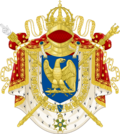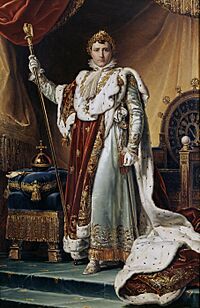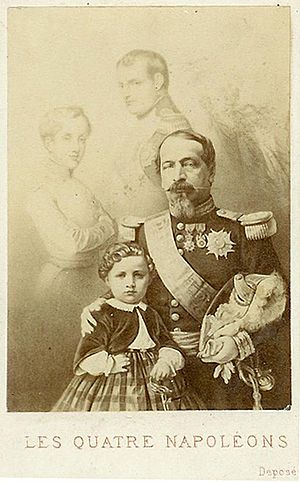Emperor of the French facts for kids
Quick facts for kids Emperor of the French |
|
|---|---|
| Empereur des Français | |
|
Imperial
|
|

|
|

|
|
| Details | |
| Style | His Imperial Majesty |
| First monarch | Napoleon I |
| Last monarch | Napoleon III |
| Formation | 18 May 1804 2 December 1852 |
| Residence | Tuileries Palace, Elysée-Napoléon, Paris |
| Pretender(s) | Jean-Christophe Napoléon |
The Emperor of the French (in French: Empereur des Français) was a special title. It was used by the main ruler of France during two periods. These periods were called the First French Empire and the Second French Empire. The title showed that the emperor ruled over the French people. It also meant they ruled with the people's agreement.
Contents
Becoming Emperor of the French

The title of Emperor was first used by the House of Bonaparte. This happened when Napoleon Bonaparte was made Emperor. The Senate, a government group, announced him Emperor on May 18, 1804. He was then crowned Emperor of the French on December 2, 1804. This big event took place at the Notre-Dame cathedral in Paris.
The title "Emperor of the French" was very important. It meant the emperor ruled over the French people. This was different from ruling over France as a country. It showed that the people had a say in who ruled them.
A New Kind of Rule
The old title, "King of France," suggested the king owned France. But the new title, "Emperor of the French," meant a constitutional monarchy. This is a system where the ruler's power is limited by laws. It also showed that France had changed after the French Revolution. The old feudal system, where land was owned by nobles, was gone. Instead, France became a nation state with equal citizens.
The title "Emperor" also linked back to ancient Rome. Roman generals who won great battles were sometimes called Imperator. This word meant "commander." It showed that Napoleon was a strong leader, especially of the army.
Napoleon I's Reign
Napoleon I ruled until June 22, 1815. He was defeated at the Battle of Waterloo. After this, he was sent away to the island of Saint Helena. He died there on May 5, 1821.
His rule was briefly stopped in 1814. This was during the Bourbon Restoration, when the old kings returned. Napoleon was sent to Elba. But he escaped less than a year later. He came back to rule for another 111 days before his final defeat.
Napoleon III and the Second Empire
Later, Napoleon I's nephew, Louis-Napoléon Bonaparte, became a leader. He took power in 1851. In 1852, the French Second Republic changed into the Second French Empire. This was decided by a public vote.
Louis-Napoléon Bonaparte officially became Napoleon III, Emperor of the French. This happened on December 2, 1852. His rule ended on July 28, 1870. Power was given to his wife, Empress Eugenie. Napoleon III was officially removed from power on September 4, 1870. This was after he was defeated and captured during the Franco-Prussian War. He was later exiled to the United Kingdom and died there in 1873.
Claimants to the Throne
After Napoleon III's only son, Louis-Napoléon, died in 1879, there have been several people who claim to be the rightful head of the Bonaparte family. The current person who claims this position is Jean-Christophe, Prince Napoléon.
Honours and Awards
Napoleon I received or created many special honours during his time as Emperor. Here are some of them:
 First French Empire: Grand Master of the Legion of Honour (a very important award)
First French Empire: Grand Master of the Legion of Honour (a very important award) First French Empire: Grand Master of the Order of the Reunion
First French Empire: Grand Master of the Order of the Reunion Kingdom of Italy: Grand Master of the Order of the Iron Crown
Kingdom of Italy: Grand Master of the Order of the Iron Crown Austrian Empire: Grand Cross of the Order of St. Stephen, 1810
Austrian Empire: Grand Cross of the Order of St. Stephen, 1810 Kingdom of Bavaria: Knight of the Order of St. Hubert, 1805
Kingdom of Bavaria: Knight of the Order of St. Hubert, 1805 Kingdom of Denmark: Knight of the Order of the Elephant, May 18, 1808
Kingdom of Denmark: Knight of the Order of the Elephant, May 18, 1808 Kingdom of Portugal: Grand Cross of the Sash of the Three Orders, May 8, 1805
Kingdom of Portugal: Grand Cross of the Sash of the Three Orders, May 8, 1805 Kingdom of Prussia: Knight of the Order of the Black Eagle, 1805
Kingdom of Prussia: Knight of the Order of the Black Eagle, 1805 Russian Empire: Knight of the Order of St. Andrew, July 1807
Russian Empire: Knight of the Order of St. Andrew, July 1807 Kingdom of Spain: Knight of the Order of the Golden Fleece, 1805
Kingdom of Spain: Knight of the Order of the Golden Fleece, 1805 Kingdom of Sweden: Knight of the Order of the Seraphim, February 3, 1811
Kingdom of Sweden: Knight of the Order of the Seraphim, February 3, 1811
List of French Emperors
First French Empire
| Name | Lifespan | Reign start | Reign end | Notes | Family | Image |
|---|---|---|---|---|---|---|
Napoleon I
|
15 August 1769 – 5 May 1821 (aged 51) | 18 May 1804 | 11 April 1814 | — | Bonaparte |  |
Hundred Days
This period is seen as a short return of the First French Empire.
| Name | Lifespan | Reign start | Reign end | Notes | Family | Image |
|---|---|---|---|---|---|---|
Napoleon I
|
15 August 1769 – 5 May 1821 (aged 51) | 20 March 1815 | 22 June 1815 | Bonaparte |  |
|
Napoleon II
|
20 March 1811 – 22 July 1832 (aged 21) | 22 June 1815 | 7 July 1815 | Son of Napoleon I | Bonaparte |  |
Second French Empire
| Name | Lifespan | Reign start | Reign end | Notes | Family | Image |
|---|---|---|---|---|---|---|
| Napoleon III | 20 April 1808 – 9 January 1873 (aged 64) | 2 December 1852 | 4 September 1870 | Nephew of Napoleon I Cousin of Napoleon II |
Bonaparte |  |
See also
 In Spanish: Emperador de los franceses para niños
In Spanish: Emperador de los franceses para niños
- Crown of Napoleon
- French Crown Jewels
- List of French consorts
- List of French monarchs
 | Ernest Everett Just |
 | Mary Jackson |
 | Emmett Chappelle |
 | Marie Maynard Daly |

